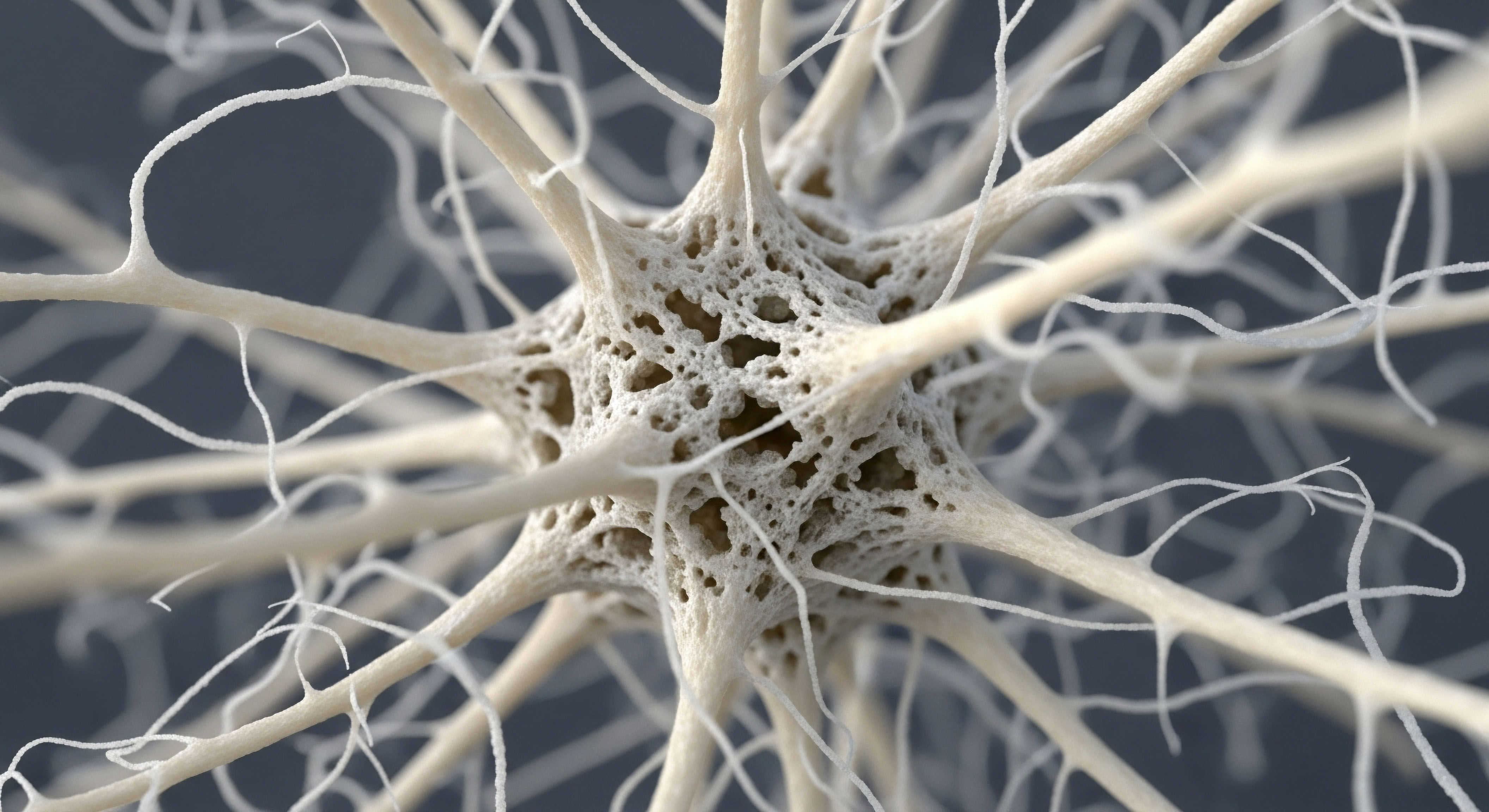

The Body’s Fading Resonance
The human form, an engineering marvel, experiences a gradual descent from its peak performance. This trajectory, often dismissed as an unavoidable aspect of aging, represents a biological entropy. A decline in vital systems, rather than an inevitable surrender, presents a call for proactive intervention. We identify these shifts as opportunities for systemic recalibration, restoring optimal function. The essence of vitality hinges on understanding and then mastering these internal dynamics.

Endocrine System ∞ Orchestrating Decline
Hormonal homeostasis, the intricate balance governing nearly every physiological process, undergoes significant alterations with advancing years. Testosterone and estrogen levels diminish, affecting more than reproductive capacity. These changes ripple through metabolic function, body composition, and cognitive sharpness. Growth hormone, another critical regulator, sees its pulsatile release attenuate, impacting cellular repair and regeneration.
Thyroid hormones, fundamental to metabolic rate and brain function, can also experience shifts, leading to subtle yet profound systemic slowdowns. The body’s internal messaging network loses its precise timing and signal strength.
The human aging process brings about various changes in hormonal homeostasis, encompassing alterations in hormonal secretion, feedback loops, and receptor sensitivity. These shifts profoundly influence cognitive functions, impacting neurotransmitters and increasing oxidative stress.
The Hypothalamic-Pituitary-Gonadal (HPG) axis, a central command system, illustrates this perfectly. Its feedback loops, once robust and responsive, become less sensitive, leading to a diminished output of essential hormones. This affects physical stamina, mental drive, and emotional equilibrium. Recognizing these systemic compromises forms the bedrock of any meaningful biological optimization strategy.

Metabolic Drift ∞ Energy System Compromise
Metabolic health stands as a cornerstone of longevity and peak performance. With age, cellular energy regulation often falters. Insulin sensitivity declines, making the body less efficient at processing glucose. This metabolic drift lays the groundwork for systemic inflammation and compromises cellular function. Mitochondria, the powerhouses of our cells, exhibit reduced efficiency and increased oxidative stress.
This manifests as reduced stamina, slower recovery, and an unwelcome accumulation of adipose tissue. Understanding the nuances of metabolic dysfunction offers a pathway to restoring the body’s energy production.
The degradation of coenzymes like NAD+ plays a substantial role in this metabolic slowdown. NAD+ is vital for sirtuin activity, enzymes regulating DNA expression and cellular repair. By middle age, NAD+ levels can plummet, triggering a cascade of robustness breakdown across organs and tissues. Boosting NAD+ levels offers a pathway to enhancing energy production and upregulating cellular repair.

Cognitive Resilience ∞ A Fading Signal
The mind’s acuity often parallels the body’s physical state. Hormonal shifts profoundly influence cognitive functions, including memory recall, concentration, and executive decision-making. Declining levels of estrogen and testosterone correlate with decreased cognitive performance in healthy adults. Menopause, for instance, often brings memory difficulties and mental fogginess. Andropause, while often less acute, yields similar effects on male cognition.
Research indicates a strong connection between an earlier age of menopause and reduced performance across various cognitive domains. Estrogen receptor beta (ERβ) in astrocytes, a type of brain cell, holds a central role in maintaining hippocampal function. This suggests a direct biological link between hormonal status and brain health.


Precision Protocols for Systemic Renewal
Reclaiming your biological edge requires a precise, data-driven approach, moving beyond generalized wellness advice. This involves targeted interventions designed to restore physiological balance and elevate systemic function. We leverage advanced understanding of endocrinology and peptide science to create a bespoke roadmap for superior output. The objective involves not simply symptom management, but a true elevation of your internal operating system.

Hormonal Harmonization ∞ Testosterone’s Influence
Testosterone, a central hormone for male vitality, influences muscle mass, bone density, libido, and cognitive function. For men with confirmed hypogonadism, characterized by consistent symptoms and unequivocally low serum testosterone, targeted replacement therapy becomes a strategic imperative. Clinical guidelines establish clear diagnostic criteria, requiring morning fasting total testosterone levels measured on at least two separate occasions. Levels below 230 ng/dL present a clear indication for intervention.
Testosterone replacement therapy is appropriate for men with testosterone deficiency syndrome who have cardiovascular disease or are at risk of cardiovascular disease. Hypogonadal men with successfully treated prostate cancer may also qualify, requiring specialist referral and close monitoring.
The objective of testosterone therapy extends to achieving a mid-normal range, typically between 350-600 ng/dL. This careful titration avoids supraphysiological levels while optimizing clinical benefits. Monitoring protocols mandate regular assessment of symptom response, adverse effects, and laboratory parameters, including hematocrit and prostate-specific antigen (PSA). This meticulous approach ensures safety and efficacy.

Peptide Modulators ∞ Cellular Instruction
Peptides, sequences of amino acids, act as intelligent signaling molecules within the body, delivering specific instructions to cellular architects. They offer a sophisticated pathway to influence biological processes at a fundamental level. For instance, compounds like Nicotinamide Mononucleotide (NMN) serve as direct precursors to NAD+, a coenzyme central to energy production and cellular repair. Supplementation with NMN can significantly increase NAD+ biosynthesis, enhancing insulin sensitivity, improving mitochondrial function, and upregulating cellular repair mechanisms.
Other peptides target growth hormone secretion, influencing body composition, recovery, and overall cellular rejuvenation. These modulators offer a powerful tool for those seeking to fine-tune their biology. The strategic application of peptides represents a cutting-edge approach to unlocking the body’s inherent capacity for repair and optimization.
Considerations for peptide integration:
- Targeted action on specific biological pathways.
- Potential for enhanced recovery and cellular regeneration.
- Influence on metabolic markers and energy output.
- Requires precise dosing and understanding of mechanisms.

Data-Driven Refinement ∞ The Feedback Loop
A true biological recalibration demands continuous feedback and adjustment. This involves moving beyond standard laboratory tests to embrace a more granular understanding of your internal state. Tools like the oral glucose tolerance test (OGTT) with insulin measurements, continuous glucose monitoring (CGM), and advanced lipid panels provide a clearer picture of glucose and insulin handling. These insights enable earlier intervention, long before fasting glucose or HbA1c signal trouble.
This approach transforms health management into a systems-engineering challenge. Every data point becomes a signal, indicating where targeted adjustments can yield the greatest returns. This iterative process of measurement, intervention, and re-measurement forms the core of sustained biological excellence.


The Continuum of Elevated Existence
The journey of biological recalibration unfolds as a dynamic progression, not a static event. Understanding the timeline of adaptation and the commitment to sustained refinement defines the true Vitality Architect. This process cultivates a life where peak performance and robust health extend far beyond conventional expectations.

Immediate Shifts ∞ Initial Response
The body responds to targeted interventions with remarkable efficiency. Individuals often report initial shifts within weeks, manifesting as improved energy levels, enhanced mood, and a clearer mental state. For example, testosterone replacement therapy can lead to improvements in libido, sexual function, and muscle function within three to six months. These early responses provide tangible validation of the chosen path.
Metabolic interventions, such as those addressing insulin sensitivity or NAD+ levels, can similarly yield rapid improvements in energy regulation and physical stamina. The body begins to shed its inefficiencies, revealing a renewed capacity for output. This initial phase sets the foundation for deeper, more enduring transformations.

Sustained Trajectory ∞ Long-Term Adaptation
True biological mastery involves a commitment to long-term adaptation. While initial gains materialize quickly, the profound benefits of recalibration deepen over extended periods. Bone density, for instance, requires two years or more of consistent testosterone therapy to show significant improvement. This illustrates the importance of patience and adherence to protocol.
Continuous monitoring of biomarkers and regular clinical assessments guide this long-term trajectory. Adjustments to protocols become necessary as the body adapts and as new insights from longevity science emerge. This proactive engagement ensures that the physiological systems remain optimized, consistently pushing the boundaries of what is considered possible.
This long-term vision positions individuals as early adopters of a smarter, more optimized way of living. The narrative involves not just extending lifespan, but enhancing healthspan, ensuring every added year comes with an elevated quality of life. This represents a strategic investment in your future self.

Perpetual Optimization ∞ The Evolving Self
Biological recalibration is an ongoing dialogue with your physiology. The concept of a fixed endpoint dissolves, replaced by a commitment to perpetual optimization. As scientific understanding expands and new therapeutic modalities emerge, the opportunities for refinement multiply. This involves staying at the forefront of research, continuously integrating validated advancements into your personal regimen.
This approach views the body as a high-performance system, always capable of being tuned for superior output. The proactive pursuit of biological excellence defines a life lived with purpose and sustained vigor. This is the future of human potential, shaped by informed choice and precise intervention.

Mastering Your Biological Imperative
The journey to reclaim your edge transcends simple health management. It represents a deliberate choice to sculpt your own biological destiny, defying the passive acceptance of decline. This path demands precision, informed by rigorous science, and a vision of what sustained peak performance truly means. You hold the blueprint for an elevated existence.



